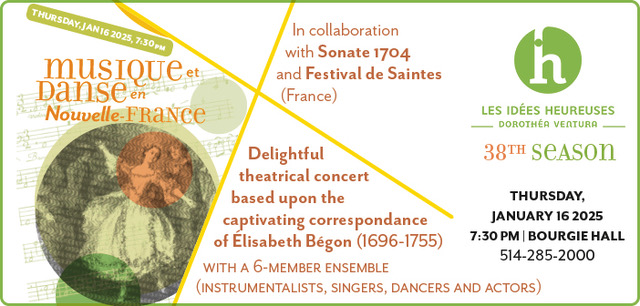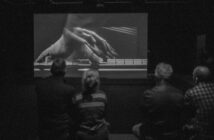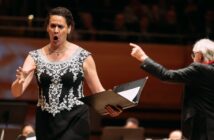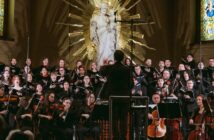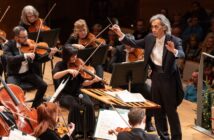
This page is also available in / Cette page est également disponible en:
![]() Francais (French)
Francais (French)
Prof. Sandeep Bhagwati is being honoured this year by the SMCQ, with their prestigious Série Hommage. Every two years, the leading Quebec organization chooses to honour one composer by featuring their work in over 200 concerts and events nationwide.
The composer’s formidable intellect is evident, based on his numerous pursuits and artistic projects which span the course of an impressive and highly successful career.
Born in Mumbai, educated in Austria, Germany and France, Bhagwati writes operas, orchestral and ensemble compositions and chamber music, creates multimedia concert installations, and composes what he calls comprovisations: compositions with integrated improvisations. But who exactly is Sandeep Bhagwati?
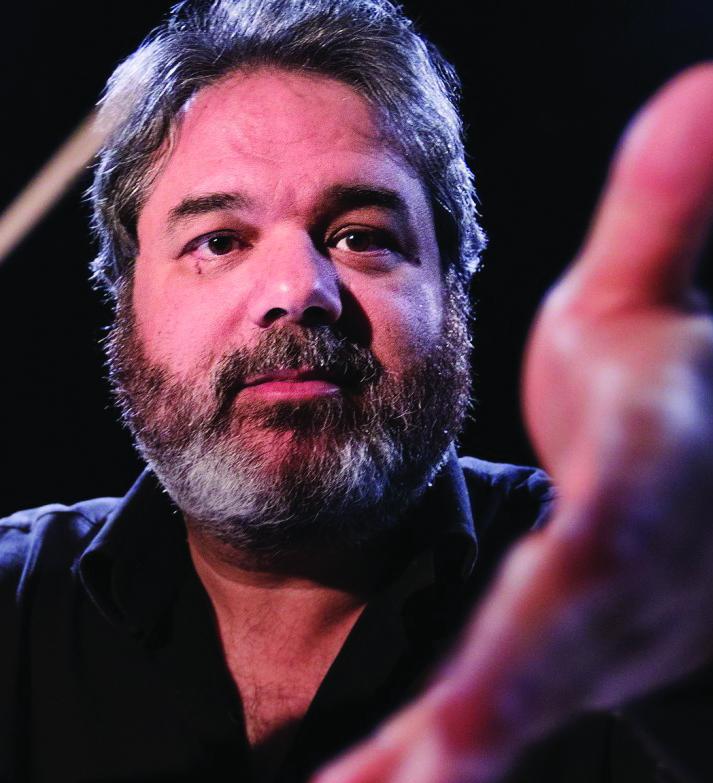
Sandeep Bhagwati
“I’m an artist,” he says. “I’m a composer by training and by profession, but I don’t see myself primarily as such. I go at it (as) someone who wants to make a piece of art and engage artistically with the world. Music is a great way for me to do that, but I also write poetry, I work with visual artists, and I’ve done a lot of theatre directing and conducting.”
Bhagwati and I had our conversation in his office at Concordia University in Montreal. Along the way, we discussed our backgrounds. It became clear that we shared a profound sense of belonging to more than one place, more than one cultural entity, and were both grounded by a deep passion for music and art.
“Lately,” he noted, “my practice (has included) meta-composing, or what I call mise en musique,” a compositional technique that involves collaborating with other composers, who are also skilled improvisers.
Beginning with Bhagwati’s initial artistic idea, they explore many possibilities, and ways the idea might be developed. After a period of collaborative creation, “we arrive at something which I can note down in a way that only these musicians understand, because it’s full of private remarks such as ‘do what you did when we spoke about that’! The person will remember what it was, but no one else will know.”
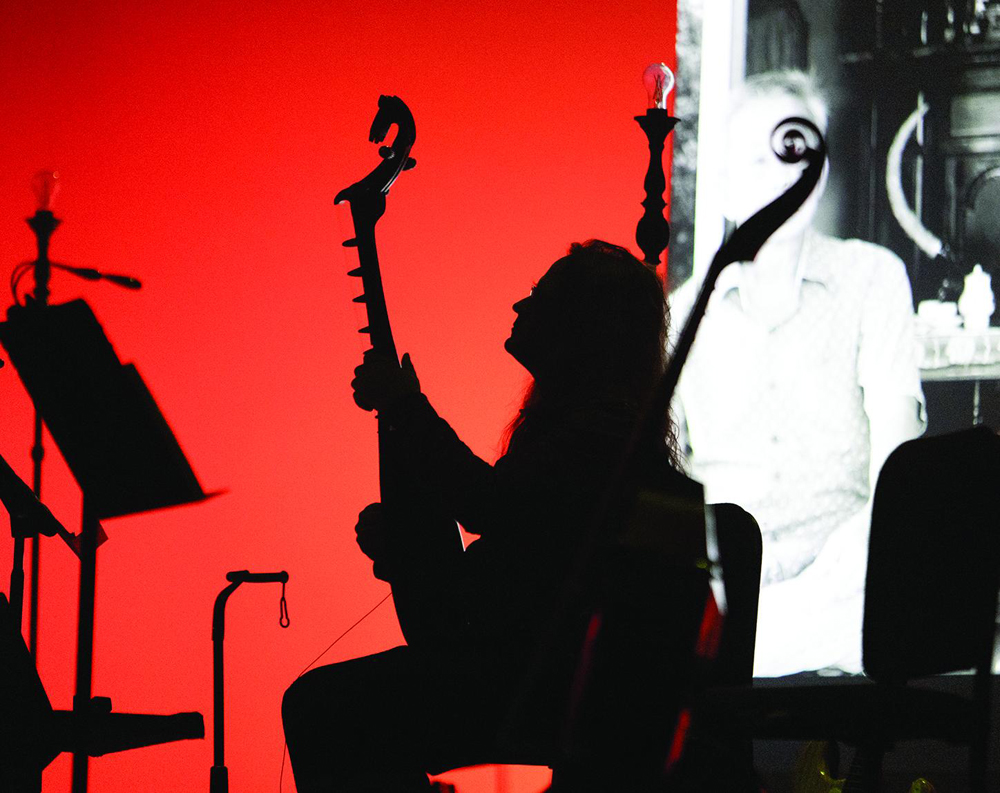
Stefan Östersjö (Photo by Alain Lefort)
On stage, the performers use the score as a road map, which guides them through their improvisation. Each player knows their role: when they are leading and when they are accompanying.
“I write conventional scores, (and) scores that can hardly be called that anymore because they’re very fluid and open to change.” This includes computer scores that adapt and change as the performer plays. “All these different ways of creating musical events or musical experiences are beyond the normal scope of a composer. It’s very hard to describe what I am because there’s no word for it,” Bhagwati concludes.
As a composer, though, how does he relinquish control over the outcome of his music? His answer centres on the idea of comprovisation.
“Comprovisation is the notion that there is no total control,” he says. “Having the experience of a traditional composer, you feel very powerless when you’re in the rehearsal room and musicians start rehearsing, especially if it’s an orchestra, and you have no time to impose your will on the performance anymore. You have written down most of it, but the fine grain of the performance is beyond your control.” Bhagwati says he sometimes notates only the piece’s most basic components, which he calls seeds. “There is a level of artistic control in terms of developing the ‘seeds’ of the work and in the collaborative evolution of the sound. I may write ‘it should be played in this mood”, or “(this passage) should use these pitches, or reflect this kind of structural or social situation’.”
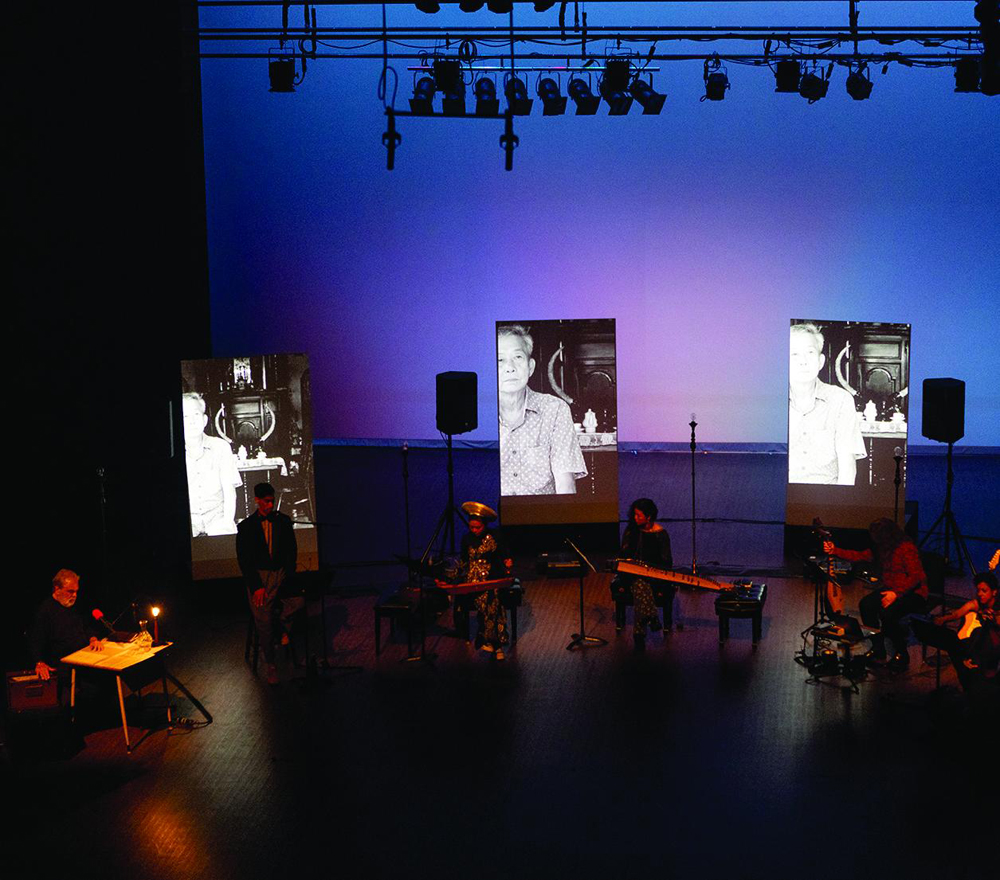
Amitiés Etrangètes (Photo by Alain Lefort)
Bhagwati explains that he sometimes asks his performers to listen to each other and engage with what they are doing with respect to specific parameters, such as rhythm, melody, and timbre. The challenge for the musician is sometimes much greater than what it might be in a traditional score, Bhagwati notes, “because in a traditional score you can practise it and then you’re done. Here you have a huge number of tasks that are expected of you and that are all situation-based.” To be able to do that, “the musicians need to be so secure within their own abilities to be open to somebody else’s playing while they’re playing.”
Despite the openness and unpredictability of his scores, though, there is something indefinably recognizable about Bhagwati’s signature. He recalls time and again hearing his comprovisational pieces being performed by various ensembles and recognizing what he calls “a family resemblance” throughout his works. “That shows me that the instructions I give are suggestive enough or give enough artistic nourishment to the musicians that they can enter the world that I imagined and create something that is consistent with it.”
The notion of cohesion comes up throughout the history of classical music—in Les neurones enchantés, for example, a book in which Pierre Boulez, Jean-Pierre Changeux, and Philippe Manoury, three eminent French intellectuals, discuss the very topic.
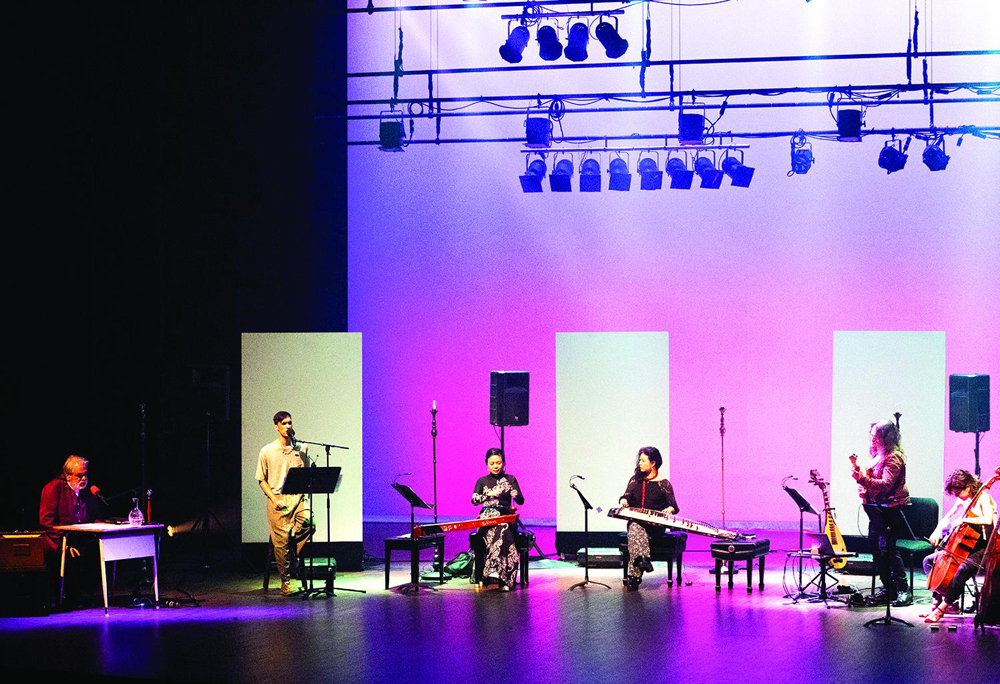
From left to right: Sandeep Bhagwati (music director and composer), Gabriel Dharmoo (experimental singing), Trần Trà My (dàn bầu), Nguyễn Thanh Thủy (dàn tranh), Stefan Östersjö (phím lõm guitar and dàn tỳ bà), and Elinor Frey (cello) (Photo by Alain Lefort)
Given the amount of diversity and unpredictability in Bhagwati’s music, the question begs to be asked: How does he reconcile tensions between cohesion and diversity? After a brief pause, he admits, unexpectedly, “I asked the same question of one of my teachers, Bogusław Schaeffer. He told me: ‘Sandeep, listen. You can only be you. Anything you do will be tinged by your Sandeepness. So, give up with coherence! You cannot ever be incoherent if you let yourself be guided by your taste or if you don’t try to imitate some fashion or fad. If you just do what you are interested in, it will always be coherent. Rather look for how diverse things can be’.”
His answer made perfect sense: trust your instincts—although it helps to have instincts as powerful and creative as those of Sandeep Bhagwati. Every piece, he claims, is like a variation on himself; while dealing with the same basic material, you never have the same thing.
“I was always fascinated by artists who adopt many voices, who have many perspectives, and who are not obsessed with creating coherence or reliability in their way of doing their art, but who just went all out.” He cites being influenced by writers such as Fernando Pessoa, Olga Tokarczuk and Salman Rushdie, and musicians such as Björk, Shubha Mudgal, John Zorn and Igor Stravinsky.

Parition for Rasas
“There are probably two ways of being an artist,” Bhagwati says. “One is to drill deep into the soil of where you are, going deeper and deeper while staying within your subject, geographical location, or surroundings. The other type is the vagabond artist—the minstrel, the people who circulate culture from one place to another. They’re nomadic. We see that all over visual art; the most beautiful miniatures of India were made by Afghan, Persian and Nepalese artists who flocked to the city and made beautiful pieces that are now Indian art, but that come from many different influences.”
Bhagwati considers himself the nomadic type. His travels and experiences living in very different places around the world have inevitably influenced his art on a fundamental level. “I travel a lot and meet many people with very different views of the world. That makes me, I think, open to the notion that there are many experiences that I have no idea about.”
In a climate fraught with fragmentation and uncertainty on several levels, including artistic and cultural, Bhagwati seems to be like a fish in water. Yet the recollection of his conversation with his mentor implied that he had at one point struggled with some of the same self-doubts many young artists and composers have in their formative years. What advice would he give to young composers?
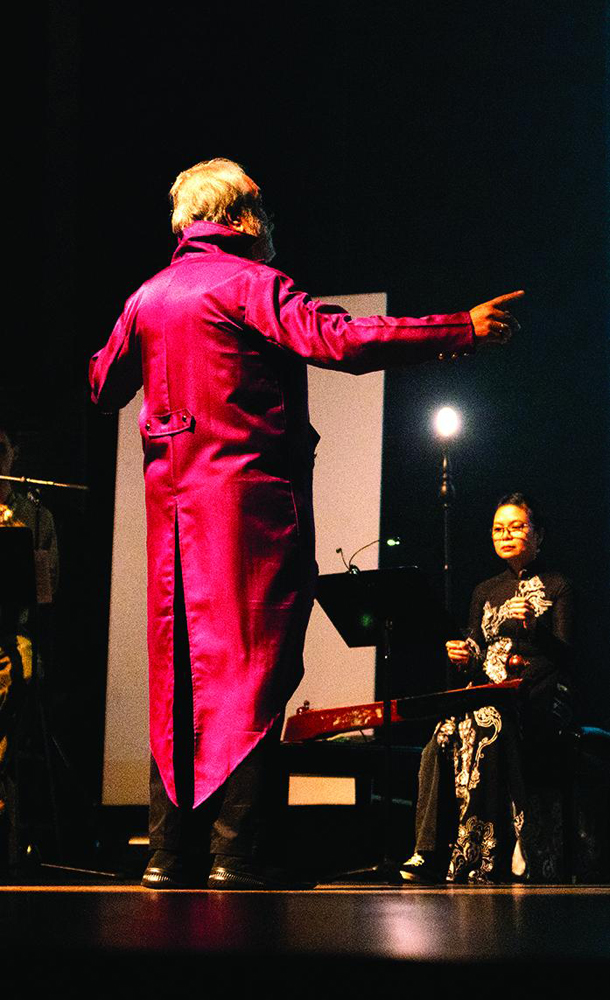
Center: Sandeep Bhagwati (music director and composer); Back: Trần Trà My (dàn bầu) (Photo by Alain Lefort)
“Embrace the uncertainty,” Bhagwati replies in a calm, assured voice. “I am not someone who looks for an answer to the complex times we live in. I think it’s not about finding yourself as much as finding your own path.” He stresses the importance of trusting one’s own perception. “Trust that you are unique, whatever anyone else says. The only reason we want you to make music as a society is because we want your vision. We don’t want you to copy a vision that is already there because we have computers for that now. We want a new perspective on the world that only you can provide because you’re the only one who was born at that point, in that city, in that climate, in that political situation. You were formed by that, along with your genetics.”
Becoming sure of oneself as an artist may take years, sometimes decades. Pedagogically, Bhagwati admits that his students are sometimes confused because he won’t tell them what to do. Instead, he asks them what they want to do. “It’s the Socratic method,” he explains. “When I know there are answers out there, I can offer some hints where to look. But it’s important to trust one’s own perceptions and one’s own thinking.
“Unfortunately,” he adds regretfully, “not many people do that. I think it’s a prerequisite for an artist. If you want to live like everybody else, reality is boring. You need artists who don’t live like anybody else to make it interesting; they preserve their unique gaze on what happens around them, their unique perspective. That’s what you should try to guard and maintain. That would be my advice to young people: don’t let yourself be disturbed.”
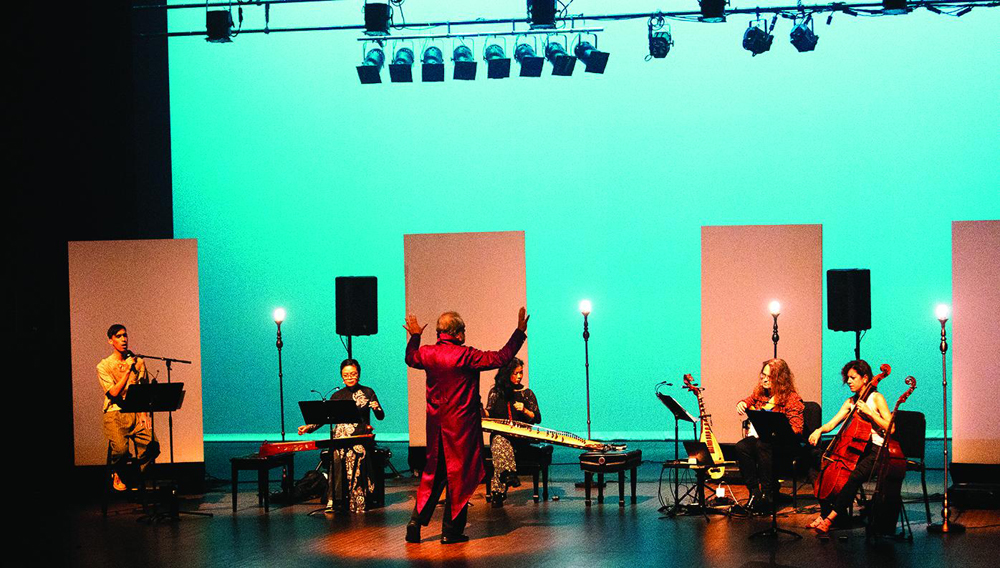
Center: Sandeep Bhagwati (music director and composer); Rear from left to right: Gabriel Dharmoo (experimental singing), Trần Trà My (dàn bầu), Nguyễn Thanh Thủy (dàn tranh), Stefan Östersjö (phím lõm guitar and dàn tỳ bà), and Elinor Frey (cello) (Photo by Alain Lefort)
Aichingerlieder Remix, the next concert in the SMCQ’s Homage series, will take place on Sunday, Oct. 22 at La Chapelle. www.smcq.qc.ca
Playlist
This page is also available in / Cette page est également disponible en:
![]() Francais (French)
Francais (French)


